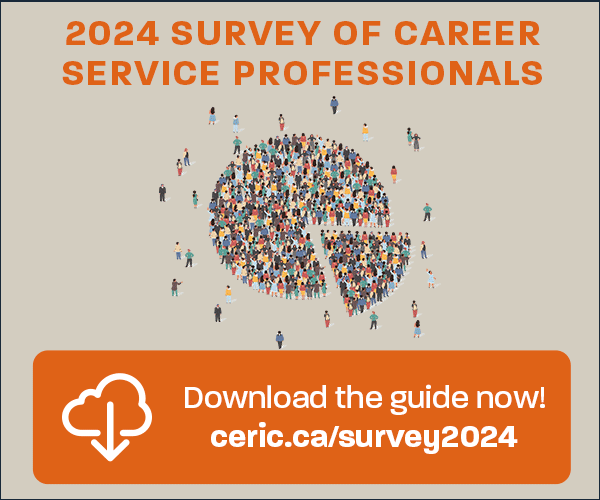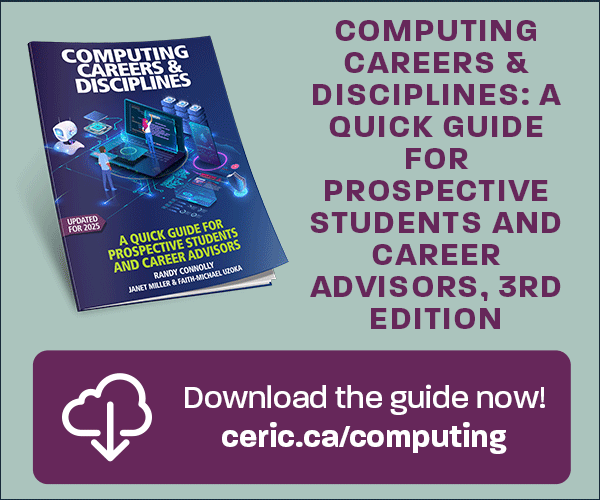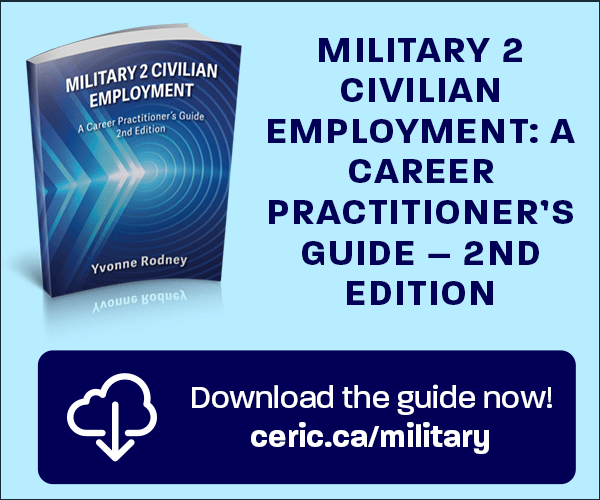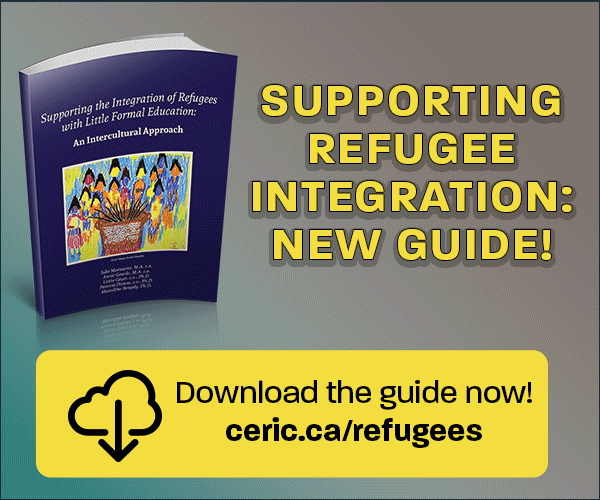Building Career Confidence: Issues and Strategies for Helping Students with Learning Disabilities Attain Career Self-Efficacy
Keywords:
career confidence, learning disabilities, self-efficacy, career, studentsAbstract
This paper is a general review of issues and strategies pertinent to the delivery of career development services to postsecondary students with learning disabilities. The authors both explore the literature and offer suggestions from clinical practice. Strategies recommendcd were derived from knowledge of
career relevant student attributes, as well as common chamctcristics of the school environment. Emphasized are the need to focus on student strengths,
and corresponding techniques which address affective, cognitive and behavioral domains.
References
Adelma, P.B. & Vogel, S.A. (1993). Issues in the employment of adults with learning disabilities. Learning Disabilities Quarterly, 16(3), 219-232.
Amundson, N.E. ( 1984). Career counseling with primary group involvement. Canadian Counsellor; 18(4), 180-186.
Atkins, C.P., & Kent, R.L. (1988). What do recruiters consider important during the employment interview? Journal of Employment Counseling. 2(3), 98-103.
Bandura, A. (1977). Self-efficacy: Toward a unifying theory of behavioral change. Psychological Review: 84, 191-215.
Bearg, E. ( 1980). Parental role modeling as a career awareness tool. Elementary School Guidance and Counseling, 4(4), 266-268.
Benz, M. R., & Halpern, A.S. (1987). Transition services for secondary students with mild disabilities: A statewide perspective. Exceptional Children 53, 507-514.
Betz, N.E. (2004). Contributions of self-efficacy theory to career counseling: A personal perspective. Career Development Quarterly, 52, 340-353.
Blalock, G., & Patton, J.R. (1996). Transition and students with learning disabilities: Creating sound futures. Journal of Learning Disabilities, 29, 7-16.
Blumsack, J., Lewandowski, L., & Waterman, B. ( 1997). Neurodevelopmental precursors to learning disabilities: A preliminary report from a parent survey. Journal of
Learning Disabilities. 30(2). 228- 237.
Brotherson, M.J., Berdine, W.H., & Sartin, V. (1993). Transition to adult services: Support for ongoing parent participation. Remedial and Special Education, 14(4), 44-51.
Brown, D., Minor, C.W., & Jepsen, D. ( 1991 ). The opinions of minority about preparing for work. Career Development Quarterly, 40 (I). 5-19.
Brown, D., & Brooks, L. ( 1991 ). Career counseling techniques. Boston: Allyn & Bacon.
Brown, D. (2003). Career information, career counseling, and career development (8th ed). Boston, MA: Allyn & Bacon.
Burgstahler, S. & Cronheim, D. (1996) Opening doors through mentoring: One program experiences using the Internet, Information Technology and Disabilities. 6(1-2), 1-4.
Clay, B. (I 999). Career Development and leadership: An information sourcebook for leadership training activities. Topeka, KS: Kansas Curriculum Center.
Cummings, Maddox & Casey (2000). Individualized transition planning for students with learning disabilities. Career Development Quarterly, 49( I), 60-73.
Dipeolu, A. (April 2002). College students with learning and attention disorders. Paper presented at the East China Normal University, People's Republic of China,
Beijing, China.
Dipeolu, A. 0., Reardon, R. Sampson, J. & Burkhead, J. (2002). The relationship between dysfunctional career thoughts and adjustment to disability in college students with teaming disabilities. Journal of Career Assessment, 10, 413-427.
Dunn, C. (1996). A status report on transition planning for individuals with learning disabilities. Journal of Learning Disabilities, 29(1 ), 17·30.
Forness, S. R. & Kavale, K.A. (1996). Social skills deficits and learning disabilities: A meta analysis of research. Journal of Learning Disabilities, 19(1). 2- 13.
Gerber, P.J. (1997). Life after school: Challenges in the workplace. In P.J. Gerber & D.S. Brown (Eds.), Learning disabilities amd employment (pp. 3-19). Austin, TX: PROED.
Goleman, D. ( 1998). Working with emotional intelligence. New York: Bantam Books.
Gore, P.A. & Leuwerke, W.C. (2000). Predicting occupational considerations: A comparison of self-efficacy beliefs, outcome expectations, and person-environment congruence. Journal of Career Assessment, 8. 237-250.
Hershenson, D.B., & Szymanski, E.M. ( 1998). Career development of people with disabilities. In R.M. Parker & E. Szymanski (Eds.), Rehabilitation counseling: Basics
and beyond (3rd cd.). Austin, TX: PRO-ED.
Hua, C.B. (2002). Career self-efficacy of the student who is gifted/learning-disabled: A case study. Journal for the Education of the Gifted, 15.375-404.
Jones, L. K. ( 1996). Jobs skills for the 21st century: A guide for students. Phoenix, AZ: Oryx
Jones, M..L., Ulicny, G.R., Czyzewski, M.J., & Plante, T.G. ( 1987). Employment in care-giving jobs for mentally disabled young adults: A feasibility study. Journal of Employment Counseling. 24(3). 122-129.
Knowles, M. ( 1970). The modern practice of adult education. New York: Association Press.
Kohler, P.O. ( 1993). Best practices in transition: Substantiated or implied? Career Development for Exceptional Individuals. /6, 107-121.
Kuykendall, M. ( 1994). On becoming an adult with learning disabilities. The Rebus Institute Report, 3( I), 8-10.
Lapan, R.T. (2004). Career development across the K- 16 years: Bridging the present to satisfying and successful futures. Alexandria, VA: American Counseling Association.
Lindstrom, L.E., & Benz, M.R. (2002). Phases of career development: Case studies of young women with learning disabilities. Exceptional Children. 69( I), 67-83.
Luzzo, D.A., Hitchings, W.E., Retish, P., & Shoemaker, A. (1999). Evaluating differences in college students' career decision making on the basis of disability status.
Career Development Quarter(v. 48(2), 142-156.
Magnuson, C.S., & Starr, M.F. (2000). How early is too early to begin life career planning? The importance of the elementary school years. The Journal of Career Development. 27, 89-101.
Markham, E. (1997). Explaining your learning disability: Disclosure in the workplace. Postsecondary Network Newsletter; 31( 3), I .
Madaus, J.W., Foley, T.E., McGuire, J.M.., & Rubin, L. M. (2001). A follow-up investigation of university graduates with learning disabilities. Career Development for
Exceptional Individuals, 24 (2), 133-146.
Mazurek, N., & Shoemaker, A. ( 1997). Career self-efficacy in college students with disabilities: Implications for secondary and post-secondary providers. ERIC Document Reproduction Service (ED 412708).
Mercer, C.D., & Mercer, A.R.(2005). Teaching students with learning Strategies for Building Career Confidence problems (7th ed.). Upper Saddle River, NJ: Pearson.
National Joint Committee on Learning Disabilities ( 1994). Learning disabilities: Issues on definition. In collective perspectives on issues affecting learning disabilities (pp. 61-66). Austin, TX: PRO-ED.
Neubert, D.A., & Taymans, J.M. ( 1989). A postsecondary model for individuals with mild disabilities: Practices and outcomes. Reading, Writing, and Learning Disabilities, 5(2) 157-164.
Ochs, L.A., & Roessler, R.T. (2001). Students with disabilities: How ready are they for the 21st century? Rehabilitation Counseling Bulletin. 44(3), 170-182.
Panagos, R.J., & DuBois, D.L. ( 1999). Career self-efficacy development and students with learning disabilities. Learning Disabilities Research and Practice, I 4( 1), 25-34.
Paulson, A.M., & Betz, N.E. (2004). Basic confidence predictors of career decision-making self-efficacy. Career Development Quarterly, 52, 354-362.
Powers, L.E., Wilson, R., Matuszewski, J., Philips, A., Rein, C., Schumacher, D., & Gcnscrt, J. (1996). Facilitating adolescent self determination: What does it take? In D.J. Sands & M.L. Wehmeyer (Eds.), Self-determination across the life span: Independence and choice for people with disabilities (pp. 257-284). Baltimore: Brookes.
Price, L.A. & Shaw, S.F. (2000). An adult instructional model of adults with learning disabilities. Journal for Vocational Special Needs Education, 22(3), 14-24.
Price, L.A., & Shaw, S.S. (2000). Adult education and learning disabilities. Career Development for Exceptional Individuals. 23(2), 187-204.
Ramasamy, R., Duffy, M. & Camp, J.L. (2000). Transition from school to adult life: Critical issues for Native American youth with and without learning disabilities. Career Development for Exceptional Individuals, 23(2), 157-171.
Reed, C.A., Reardon, R.C., Lenz, J.G., Leicrcr, S.J. (2001 ). A cognitive career course: From theory to practice. Career Development Quarterly, 50(2). I58-178.
Reekie, F.A. (1995). Strategic action plan with clients who have learning disabilities. Journal of Employment Counseling. 32(4), 164-180.
Rosenbaerg, M.S. ( 1997). Learning disabilities occurring concomitantly with other disability and exceptional conditions. Journal of Learning Disabilities. 30(3), 242-244.
Rife, J.C., & Belcher, J.R. (1993). Social support and job search intensity among older unemployed workers: Implications for employment counselors. Journal of
Employment Counseling. 30(3). 98- 107.
Riggion, R.E., & Throckmorton, B. (1987). Effects of prior training and verbal errors on students' performance in job interviews. Journal of Employment Counseling, 29, I0-16
Sampson, J.P., Reardon, R.C., Peterson, G.W., & Lcnz, J.G. (2004). Career counseling and services. Belmont, CA: Brooks/Cole.
Saka, N., Gati, 1., & Kelly, K.R. (2004, June) Career indecisiveness: Emotional and personality aspects of career decision-making difficulties. Paper presented at the
National Career Development Association Annual Meeting, San Francisco, CA.
Sitlington, P.L. & Fran, A.R. ( 1990). Arc adolescents with learning disabilities successfully crossing the bridge into adult life? Learning Disabilities Quarter(v. 13. 431-436.
Smedley, M., Levinson, E.M., Barker, W.F., & DeAngelis, D.L. (2003). Differences in career maturity among adjudicated and non-adjudicated male students with and without disabilities. Journal of Employment Counselling. 40(3), 108-122.
Schunk, D.H. (1989). Self-efficacy and cognitive achievement: Implications for students with learning problems. Journal of Learning Disabilities, 24, 459-466.
Szymanski, E. M., Hewitt, G.J., Watson, E.A., & Sweet, E.A. (1999). Faculty and instructor perception of disability support services and student communication.

Downloads
Published
How to Cite
Issue
Section
License

This work is licensed under a Creative Commons Attribution-NonCommercial-NoDerivatives 4.0 International License.
















